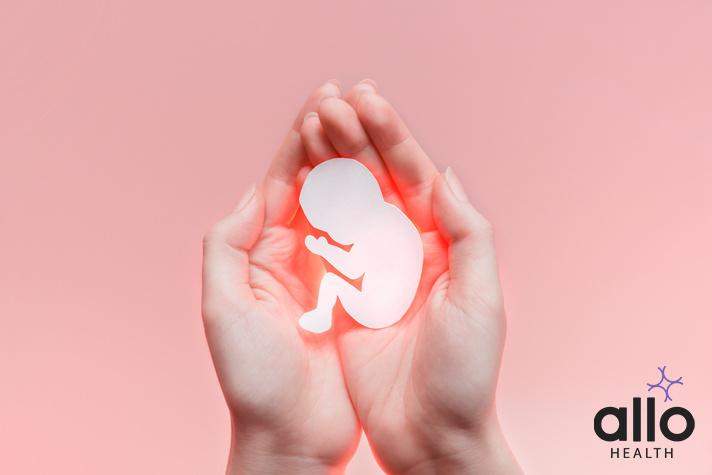Can Vibrators Cause Infertility?

Allo Health is dedicated to personalized well-being, offering support and trusted information tailored to individual health goals. The platform emphasizes human-generated content, led by a distinguished medical team of experts, including physicians and sexual health specialists. Their commitment to credibility involves rigorous fact-checking, authoritative research, and continuous updates to ensure accurate, up-to-date information. Allo Health's unique approach goes beyond conventional platforms, providing expert-led insights and a continuous commitment to excellence, with user feedback playing a crucial role in shaping the platform's authoritative voice.

Dr. Aditi completed her undergraduate medical education at AJIMS, Mangalore, after which she worked in multi-speciality hospitals with COVID patients and in the Pain and Palliative medicine department. Driven by her experiences, she developed a keen interest in psychiatry. Dr. Aditi believes that mental health is just as, if not more important, than physical health.
Why This Was Upated?
Our experts continually monitor the health and wellness space, and we update our articles when new information became available.
Updated on 01 February, 2024
- Article was updated as part of our commitment to diversity, equity, and inclusion.

"The following blog article provides general information and insights on various topics. However, it is important to note that the information presented is not intended as professional advice in any specific field or area. The content of this blog is for general educational and informational purposes only.
Book consultation
The content should not be interpreted as endorsement, recommendation, or guarantee of any product, service, or information mentioned. Readers are solely responsible for the decisions and actions they take based on the information provided in this blog. It is essential to exercise individual judgment, critical thinking, and personal responsibility when applying or implementing any information or suggestions discussed in the blog."
With the increasing use of vibrators for sexual pleasure, concerns have arisen regarding their potential impact on fertility. A quick Google search brings up countless articles claiming that vibrators can decrease sperm count in men and lead to female infertility. But, how much truth is there to these claims? In this article, we will examine the science behind vibrator use and fertility, debunk common myths, and provide expert advice on how to reduce the risk of infertility caused by vibrators.
The Science Behind Vibrators and Infertility: Separating Fact from Fiction
The use of vibrators for sexual pleasure has been around for decades. Only recently has there been a growing concern about their impact on fertility. Some studies have suggested that high-frequency vibrator use in men can decrease sperm motility and count, while others have found no significant effect. Similarly, studies on the impact of vibrator use on female fertility have been inconclusive.
The truth is, more research is needed to definitively answer this question.
Despite the inconclusive findings on the impact of vibrator use on fertility, there are other potential health risks associated with their use. For example, frequent or prolonged use of vibrators can cause genital numbness or desensitization, which can lead to difficulty achieving orgasm without the use of a vibrator. Improper cleaning and sharing of vibrators can increase the risk of sexually transmitted infections.
Use vibrators safely and responsibly, and to prioritize communication and consent with sexual partners.
How Do Vibrators Work and What Are Their Effects on Fertility?
Vibrators work by producing rapid and intense vibrations that stimulate the genitals. The effects of these vibrations on fertility are not yet fully understood. Some experts believe that the pressure and heat generated by prolonged and repetitive vibrator use may cause tissue damage, leading to decreased fertility. However, there is little scientific evidence to support this claim.
On the other hand, some studies have suggested that vibrator use may actually have a positive effect on fertility. The increased blood flow and stimulation to the genitals may improve overall reproductive health and increase the chances of conception. Vibrator use can enhance sexual pleasure and intimacy, which can lead to more frequent and enjoyable sexual activity, further increasing the likelihood of conception.
The effects of vibrator use on fertility may vary depending on individual factors such as age, overall health, and frequency of use. It is always recommended to consult with a healthcare provider before using a vibrator or any other sexual aid, especially if you are trying to conceive or have concerns about your reproductive health.
Exploring the Link Between Vibrator Use and Decreased Sperm Count
Some studies have suggested that high-frequency vibrator use can decrease sperm count and motility in men. However, other studies have found no significant correlation between vibrator use and sperm count. Many factors can impact sperm count, including age, weight, smoking, and alcohol consumption. Therefore, it’s difficult to determine if vibrator use alone is the sole cause of decreased sperm production in men.
Despite the conflicting findings, it’s recommended that men who are trying to conceive with their partners limit their vibrator use or avoid it altogether. Additionally, practice safe and hygienic vibrator use to prevent the spread of sexually transmitted infections.
If you’re concerned about your sperm count or fertility, it’s best to consult with a healthcare professional who can provide personalized advice and treatment options.
The Impact of Vibrators on Female Fertility: What You Need to Know
While there is no conclusive evidence that vibrator use has any direct effect on hormone levels and causes infertility in women, there are some potential health risks to be aware of.
Prolonged and repetitive vibrator use can cause tissue damage, which may lead to decreased fertility. Additionally, some women may experience discomfort or pain during vibrator use, which could signal an underlying medical condition that could affect fertility.
The Role of Frequency and Duration of Vibrator Use in Infertility Risk
The frequency and duration of vibrator use can impact the potential risks to fertility. High-frequency and long-duration use may increase the risk of tissue damage and decreased fertility. However, occasional and short-duration use is unlikely to have any significant impact on fertility.
It’s also worth noting that the type of vibrator used can play a role in potential fertility risks. Vibrators with higher intensity or those that produce a lot of heat may increase the risk of tissue damage and decreased fertility. It’s important to choose a vibrator that is designed for safe use and to follow the manufacturer’s instructions carefully to minimize any potential risks.

Can Overuse of Vibrators Lead to Permanent Infertility?
There is no evidence to suggest that overuse of vibrators can lead to permanent infertility in either men or women. However, prolonged and repetitive use may cause tissue damage, which could lead to temporary fertility problems. If you experience pain or discomfort during vibrator use, it’s essential to seek medical attention to rule out any underlying medical conditions that may be affecting fertility.
Infertility can be caused by a variety of factors, including age, genetics, and lifestyle choices. While vibrator use may not directly cause permanent infertility, it’s crucial to maintain overall reproductive health by practicing safe sex, getting regular check-ups, and avoiding risky behaviors such as smoking and excessive alcohol consumption.
Using vibrators can have positive effects on sexual health and pleasure. Vibrators can help individuals explore their bodies and discover what feels good, leading to more satisfying sexual experiences. It’s important to use vibrators safely and responsibly, following manufacturer instructions and cleaning them regularly to prevent infections or other health issues.
Debunking Common Myths About Vibrators and Fertility
There are several common myths surrounding vibrator use and fertility.
- One myth is that vibrator use can increase the risk of developing sexually transmitted infections (STIs), which could lead to fertility problems. However, this is not accurate. STIs can be transmitted through any sexual activity, including intercourse without a vibrator.
- Another common myth is that vibrator use can desensitize the clitoris, making it more difficult to achieve orgasm without a vibrator. While it is true that frequent vibrator use can lead to temporary desensitization, this is not a permanent effect. Taking a break from vibrator use can help restore sensitivity.
Vibrator use does not have any negative impact on fertility. In fact, using a vibrator can increase blood flow to the pelvic area, which can actually improve reproductive health. Additionally, using a vibrator can help individuals explore their bodies and learn what feels good, which can lead to more satisfying sexual experiences.
How to Reduce the Risk of Infertility Caused by Vibrators
If you’re concerned about the potential impact of vibrator use on fertility, there are several steps you can take to reduce the risks.
- Limit the frequency and duration of vibrator use.
- Use low-power vibrators that are less likely to cause tissue damage. Additionally, be aware of any discomfort or pain during vibrator use and seek medical attention if necessary.
While vibrator use can potentially increase the risk of infertility, it is not a guaranteed outcome.
Other factors such as age, overall health, and pre-existing medical conditions can also play a role in fertility. It’s always a good idea to speak with a healthcare provider about any concerns you may have regarding your reproductive health.
Should You Stop Using Vibrators If You’re Trying to Conceive? Expert Advice.
If you’re trying to conceive, it’s natural to be concerned about anything that may impact your fertility. However, there is no evidence to suggest that occasional vibrator use will affect your chances of conceiving. If you’re concerned about the potential risks, speak to your healthcare provider for expert advice.
It’s important to note that while vibrator use may not directly impact fertility, certain lubricants or materials used in some vibrators may have negative effects. For example, some lubricants may contain spermicides that can harm sperm, while certain materials may cause irritation or allergic reactions. It’s important to choose a vibrator and lubricant that are safe for use when trying to conceive.
Additionally, it’s worth considering the potential psychological effects of vibrator use on your sex life and relationship. While there is no evidence to suggest that vibrator use is harmful in this regard, some couples may find that relying too heavily on vibrators can lead to a decrease in intimacy and connection. As with any aspect of your sexual health, it’s important to communicate openly with your partner and prioritize your emotional well-being.
Alternatives to Vibrators for Sexual Pleasure That May Be Safer for Fertility

If you’re looking for alternatives to vibrators for sexual pleasure, there are several options available. These include manual stimulation, oral sex, and the use of sex toys made from body-safe materials such as silicone. Additionally, exploring other forms of intimacy and sexual expression with your partner can be just as pleasurable as vibrator use.
It’s important to note that some studies have suggested that frequent use of vibrators may have negative effects on fertility. While more research is needed in this area, if you’re concerned about your fertility, it may be worth considering alternative methods of sexual pleasure. However, it’s also important to remember that there are many factors that can affect fertility, and vibrator use may not be the sole cause of any fertility issues.
The Impact of Vibrator Use on Overall Sexual Health, Beyond Fertility Concerns
While there is still much to learn about the potential impact of vibrator use on fertility, it’s essential to remember that sexual pleasure is an essential component of overall sexual health. Vibrators can enhance sexual experiences and intimacy, leading to a better quality of life and improved mental health.
Key Takeaways
- Concerns have arisen about the potential impact of vibrators on fertility, but there is currently inconclusive scientific evidence to definitively answer this question.
- Prolonged and repetitive vibrator use may cause tissue damage and desensitization, but occasional and responsible use is unlikely to have a significant impact on fertility.
- Vibrators can have positive effects on sexual health and pleasure, but it’s essential to prioritize communication, consent, and safe and hygienic use to prevent potential health risks.
- Some studies suggest that high-frequency vibrator use in men may decrease sperm count and motility, but more research is needed to determine the exact correlation.
- For those trying to conceive, it’s recommended to limit vibrator use or seek alternatives to minimize potential risks to fertility.
- Vibrator use can have other physical health benefits, such as increasing blood flow to the genital area and strengthening pelvic floor muscles.
Frequently Asked Questions
Q: Can using vibrators cause infertility in men and women?
A: There is currently no conclusive scientific evidence to prove that using vibrators directly causes infertility in men or women.
Q: Are there any potential risks associated with using vibrators?
A: Prolonged and repetitive vibrator use may lead to tissue damage and desensitization, but occasional and responsible use is unlikely to cause significant harm.
Q: Should I stop using vibrators if I’m trying to conceive?
A: Occasional vibrator use is unlikely to impact fertility significantly. However, if you have concerns, it’s best to consult a healthcare professional for personalized advice.






































